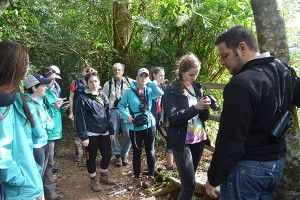A group of NMU study abroad students came out of their shells to learn about ecology and sea turtle preservation in Costa Rica. The class has now coordinated further efforts to aid the endangered species recovery.
Grammy-winning finger picking guitarist, Pat Donohue, will play a benefit show at the Ore Dock Brewing Company this Saturday, April 25. Part of the proceeds will benefit the class who will purchase and send supplies to Costa Rica to aid the endangered sea turtle recovery efforts.
The phrase the students adopted while abroad is also the motto of Costa Rica, Pura Vida, which translates to “good living,” “the good life” or “pure living,” according to David Kronk, professor of health and human performance and Costa Rica course instructor. The phrase reflects a spirit of appreciation for nature and a way of living that focuses more on enjoying this beautiful planet, Kronk said.
“It’s about taking care of the world and each other, rather than concentrating on human -produced products, diversions and the quest for lots of money,” Kronk said.
Sophomore fisheries and wildlife management major Maggie Hartman said she was strategic about choosing this specific destination as a place to study abroad.
“I love volunteering, traveling and the outdoors,” Hartman said. “I knew Costa Rica would expose me to a culture that truly cares about the environment. This assumption was correct.”
The course titled Ecology and Eco Tourism of Costa Rica was a 12-day course within the health and human performance department. The class traveled throughout the Nicoya Peninsula in Costa Rica and visited two national parks, one national wildlife refuge and two private reserves, one in the cloud forest at Monteverde, and the other in a remote jungle containing the headwaters of five rivers. They visited several ecosystems from the cool misty mountain cloud forests to beaches, coral reefs, tide pools, jungle waterfalls and rivers.
Other than witnessing the diverse ecosystems the island has to offer, senior environmental studies and sustainability major Maleah Gust said her favorite experience was helping the biologists with their sea turtle conservation efforts.
“Sea turtles are an endangered species. They are an important part of the biodiversity in Costa Rica. Only one in 1,000 baby sea turtles lives to become an adult—that’s a scary number,” Gust said. “It is illegal to eat sea turtle eggs in Costa Rica, but there are still poachers who go out to find and sell these eggs. It is important to protect the nesting ground of the sea turtles so babies have a successful chance of hatching and making it to the sea.”
Gust said the highlight of her trip was witnessing and helping hatching sea turtles take their first crawl into the ocean.
“I was able to watch 100 baby sea turtles rise out of the sand and crawl to the sea,” Gust said. “It was a once-in-a-lifetime opportunity.”
The group also found a rare leatherback turtle one night at 4 a.m. on a remote beach after a night of collecting eggs from the black sea turtles, Kronk said.
“There are only 35,000 [leatherback turtles] remaining on the earth. They are the largest sea turtle, weighing up to 1,100 pounds and measuring 4 to 6 feet long,” Kronk said. “The one we found had never been identified, tagged or named before we had the opportunity to do so. There is now a leatherback turtle in the Pacific Ocean who has the name ‘NMU Turtle.’”
The event to benefit sea turtle preservation begins at 3 p.m. Saturday, April 25 at the Ore Dock Brewing Company.Tickets are $15 in advance or $18 at the door and can be purchased at the Ore Dock.

























